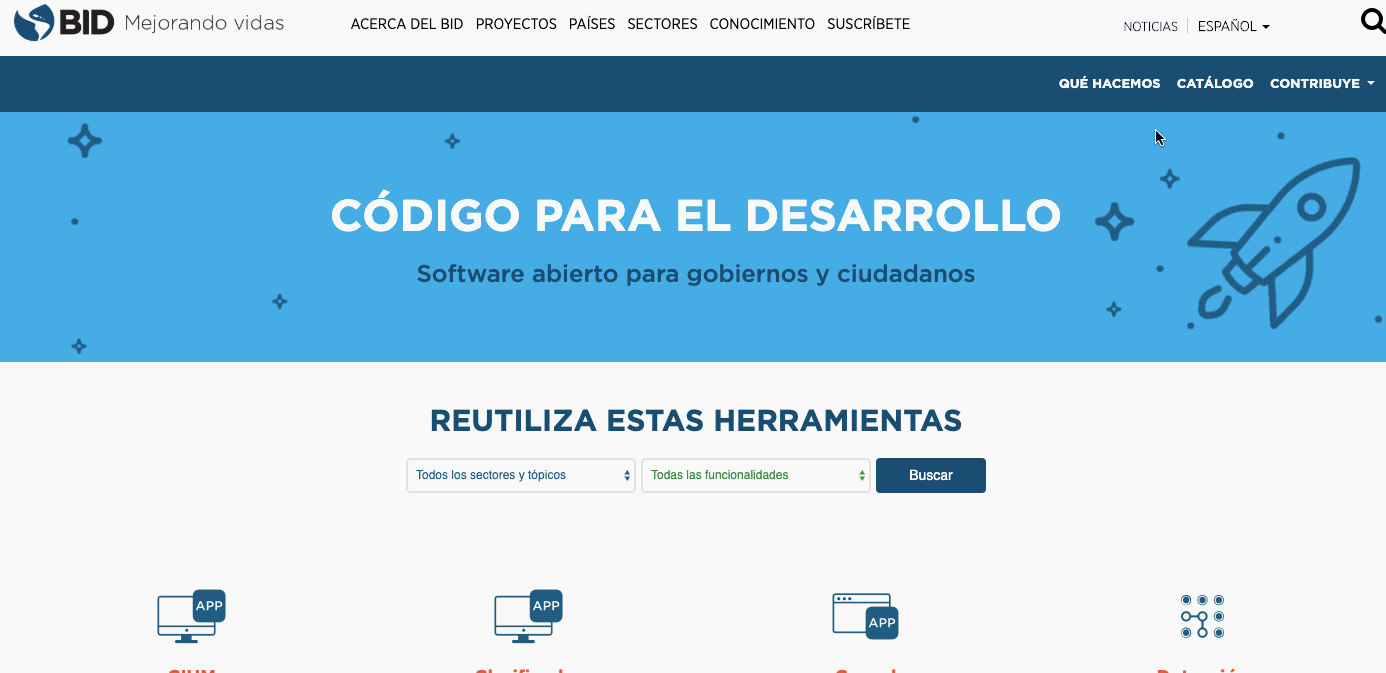Have you ever started looking for software or a digital tool to strengthen a project? Or have you thought about hiring the development of a new tool to solve a challenge?
If so, the new code.iadb.org can help you. The IDB launched the Code for Development initiative in early 2017 precisely to serve teams that seek to incorporate software into their responses to the challenges of economic and social development. As such, it is a central platform where teams that have already created open source solutions can share their stories and tools, and where teams looking to face similar challenges can find reusable solutions and learn from those stories.
Durante dos años de identificar, compartir y destacar los esfuerzos de nuestros colaboradores de código abierto en América Latina, el Caribe, y en todo el mundo, el catálogo de herramientas digitales de Código para el Desarrollo ha crecido considerablemente. Luego de consultar con varios servidores públicos, tecnólogos cívicos y desarrolladores, relanzamos la plataforma con mejor capacidad de buscar y filtrar las herramientas, más espacio para destacar los recursos de aprendizaje, y mayor enfoque en las historias que acompañan la experiencia de reutilización de software abierto y su impacto.
En este artículo, exploramos algunas de las oportunidades que brinda la nueva plataforma para que puedas aprovecharla al máximo:
1. Explora el catálogo de herramientas por función y por sector
Navega por el catálogo a partir de los filtros y encuentra herramientas de código abierto que ya puedan responder a la necesidad de tu proyecto.

Filtrar por sector
Ver ejemplos de software desarrollado para un campo particular
El catálogo de software cuenta con dos filtros independientes. El primero te permite seleccionar de un listado de “sectores y tópicos”, que son aquellas áreas temáticas de la aplicación original de una herramienta. Por ejemplo, al seleccionar “Desarrollo Urbano y Vivienda”, resulta herramientas como AP-LatAm, BA Obras, y OpenMapKit, por nombrar algunas.
Aunque cuentan con funciones distintas, lo que estas herramientas tienen en común, es que han sido aplicadas para solucionar retos en la gestión del espacio urbano. Lo mismo es el caso de las herramientas en otros sectores. Mientras sean adaptadas o reutilizadas en otras áreas, algunas herramientas pueden pertenecer a más de un sector. También, es importante recordar que es posible aplicar una herramienta a un sector diferente, aunque no esté etiquetada así.
Filtrar por función
Encontrar herramientas que cumplen una función específica
Si ya tienes una idea más específica del tipo de aplicación que necesitas, podría ser útil filtrar el catálogo por función. Hemos identificado 12 funciones diferentes, entre ellas, la gestión de registros, el procesamiento de imágenes, y la visualización de datos. Esta lista se expandirá según las nuevas herramientas que entren al catálogo.
2. Consigue el código de las herramientas

Si has identificado una herramienta que te interesa, puedes ir a su vitrina para conocer más detalles sobre su uso y especificaciones técnicas. También puedes entrar en su repositorio de GitHub para bajar o forkear el código fuente de la herramienta o la aplicación. Solamente tienes que buscar el botón que dice “Consigue el código.”
3. Comparte tu código
Si trabajas con alguna herramienta digital que está ayudando a resolver desafíos de desarrollo, y crees que puede ser de utilidad para otras organizaciones o gobiernos, éste es el lugar para compartir tu código. Código para el Desarrollo cuenta con colaboradores de todo el mundo que han puesto a disposición su código para que sea reutilizado por los demás. Puedes sumarte también a través de este link.
Antes de publicar nuevas herramientas, en Código para el Desarrollo contamos con un proceso de revisión para asegurar que el código que se comparte pueda ser reutilizado por otros, es decir, que cumple con estándares estructurales y de documentación. En esta guía explicamos el procedimiento.

Si tienes cualquier pregunta sobre el proceso, puedes enviarnos un correo a [email protected].
4. Comparte tu historia
¿Tu equipo trabaja con código abierto? ¿Tienen experiencias en adaptar o reutilizar herramientas de código abierto? Si es así, queremos conocer y compartir tu historia. Desde Código para el Desarrollo queremos alentar a más equipos a trabajar con herramientas de código abierto, así que cuéntanos como han trabajado para adaptar y reutilizar las herramientas y la compartiremos.
Publicamos sobre aprendizajes vinculados a código abierto, las contribuciones a Código para el Desarrollo y la reutilización de herramientas en el blog de Abierto al Público.

Puedes empezar a compartir tu historia completando el formulario en la página.
5. Mantente al tanto de las actividades y oportunidades de colaborar con Código para el Desarrollo
En diferentes momentos, tenemos eventos especiales o campañas enfocadas en la búsqueda de herramientas nuevas. Siempre podrás encontrar información relevante sobre estas oportunidades en la página principal, cuando estén sucediendo. Y para asegurarte de que nunca pierdas las nuevas noticias, puedes subscribirte aquí.
¿Cómo te parece la nueva plataforma de Código para el Desarrollo? Escríbenos en los comentarios.
Lee más sobre la iniciativa Código para el Desarrollo
Este artículo es una actualización de la versión original “Cómo aprovechar al máximo nuestra plataforma Código para el Desarrollo” publicado el 2 de mayo del 2017 por José Luis Delgado.

Leave a Reply